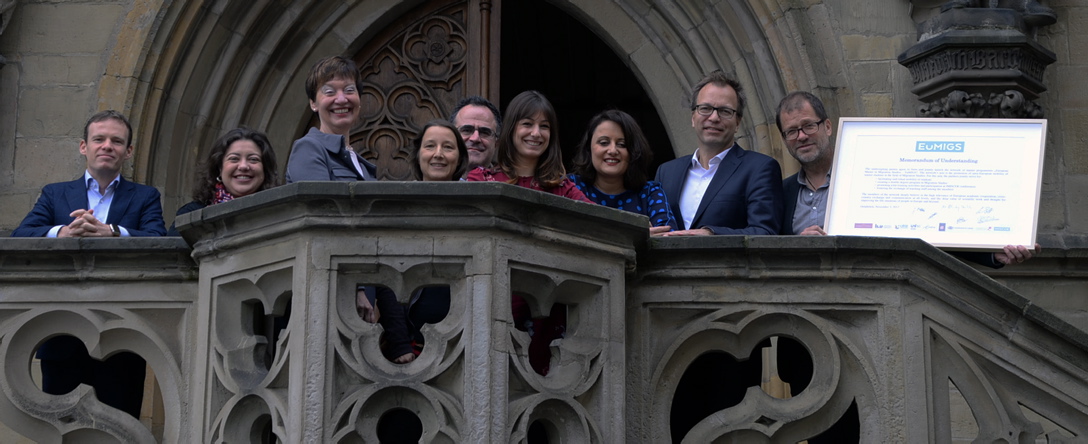The European Master in Migration Studies (EuMIGS) is an academic exchange programme that aims to promote the mobility and cross-country learning of students and the exchange of teaching staff between thirteen high-level institutes of migration research and their respective master programmes.
EuMIGS is closely connected to IMISCOE (International Migration, Integration and Social Cohesion in Europe), the Europe's largest interdisciplinary research network in the field of migration, integration and diversity studies, that since more than 15 years has brought together the most important scholars and research institutes in the field of migration in Europe.
The EuMIGS Double Degree programme
Centrepiece of the network is a Double Degree Programme between nine participating master programmes. Double Degree master students spend the respective second year of their studies at one of the partner master programmes in another country. Upon successfully finishing their studies, they receive a double degree from both, their home and host university. Also the teaching staff in the participating master programmes enter into a regular exchange and give seminars and lectures at the partner programmes.
EuMIGS exchange semester
The wider EuMIGS network includes master programmes in the field of migration that are not part of the Double Degree programme but offer their students the opportunity to spend one or two semesters at another partner institute.
Other activities
EuMIGS organizes on a regular basis joint (online) events and activities that are public or open to a large group of students at our respective partner universities. Activities that EuMIGS has organized so far include public lectures series and joint online courses.
Erasmus+ Cooperation Partnership
In September 2022, the seven EuMIGS partner institutes of the Double Degree Programme were awarded a Erasmus+ Cooperation Partnership grant by the European Commission. The total amount of 400.000 Euros allows the EuMIGS Double Degree partners to develop - over a three-year period - a joint curriculum of online and blended teaching activities. This will increase the opportunities for all migration master students at these seven universities to travel to different partner universities, participate in international training, and build up a network with fellow students of migration across Europe.

History
The EuMIGS programme was initiated by the Institute for Migration Research and Intercultural Studies (IMIS) at the University of Osnabrück. The Double Degree programme between five master programmes in migration studies was officially launched on the 3th of November 2017 in the “Peace Hall” of the town hall of Osnabrück. The first exchange students of the European Master in Migration Studies entered in autumn 2018.
The coordination of the Double Degree Programme moved to the Swiss Forum for Migration and Population Studies (SFM) at the University of Neuchâtel in the beginning of 2021.
In 2021, two migration master programmes at the Universities of Salzburg and Liège joined the Double Degree programme. The extended network has also grown continuously over the past years: The Universities of Lyon, Nice, and Rotterdam joined in 2020, and ISCTE Lisbon and EHESS and University Paris 1 joined in 2022.

